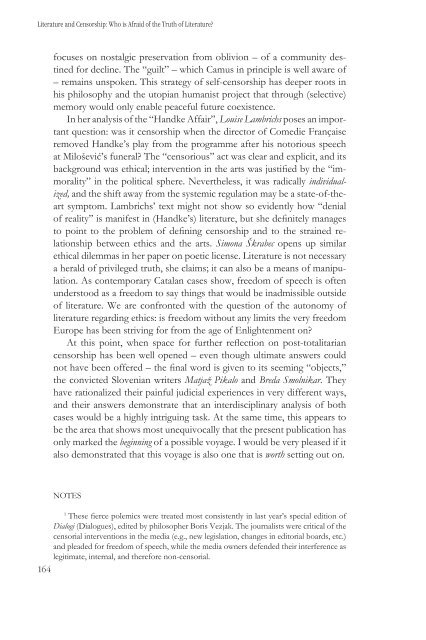Literatura in cenzura - Društvo za primerjalno književnost - ZRC SAZU
Literatura in cenzura - Društvo za primerjalno književnost - ZRC SAZU
Literatura in cenzura - Društvo za primerjalno književnost - ZRC SAZU
- No tags were found...
You also want an ePaper? Increase the reach of your titles
YUMPU automatically turns print PDFs into web optimized ePapers that Google loves.
Literature and Censorship: Who is Afraid of the Truth of Literature?focuses on nostalgic preservation from oblivion – of a community dest<strong>in</strong>edfor decl<strong>in</strong>e. The “guilt” – which Camus <strong>in</strong> pr<strong>in</strong>ciple is well aware of– rema<strong>in</strong>s unspoken. This strategy of self-censorship has deeper roots <strong>in</strong>his philosophy and the utopian humanist project that through (selective)memory would only enable peaceful future coexistence.In her analysis of the “Handke Affair”, Louise Lambrichs poses an importantquestion: was it censorship when the director of Comedie Françaiseremoved Handke’s play from the programme after his notorious speechat Milošević’s funeral? The “censorious” act was clear and explicit, and itsbackground was ethical; <strong>in</strong>tervention <strong>in</strong> the arts was justified by the “immorality”<strong>in</strong> the political sphere. Nevertheless, it was radically <strong>in</strong>dividualized,and the shift away from the systemic regulation may be a state-of-theartsymptom. Lambrichs’ text might not show so evidently how “denialof reality” is manifest <strong>in</strong> (Handke’s) literature, but she def<strong>in</strong>itely managesto po<strong>in</strong>t to the problem of def<strong>in</strong><strong>in</strong>g censorship and to the stra<strong>in</strong>ed relationshipbetween ethics and the arts. Simona Škrabec opens up similarethical dilemmas <strong>in</strong> her paper on poetic license. Literature is not necessarya herald of privileged truth, she claims; it can also be a means of manipulation.As contemporary Catalan cases show, freedom of speech is oftenunderstood as a freedom to say th<strong>in</strong>gs that would be <strong>in</strong>admissible outsideof literature. We are confronted with the question of the autonomy ofliterature regard<strong>in</strong>g ethics: is freedom without any limits the very freedomEurope has been striv<strong>in</strong>g for from the age of Enlightenment on?At this po<strong>in</strong>t, when space for further reflection on post-totalitariancensorship has been well opened – even though ultimate answers couldnot have been offered – the f<strong>in</strong>al word is given to its seem<strong>in</strong>g “objects,”the convicted Slovenian writers Matjaž Pikalo and Breda Smolnikar. Theyhave rationalized their pa<strong>in</strong>ful judicial experiences <strong>in</strong> very different ways,and their answers demonstrate that an <strong>in</strong>terdiscipl<strong>in</strong>ary analysis of bothcases would be a highly <strong>in</strong>trigu<strong>in</strong>g task. At the same time, this appears tobe the area that shows most unequivocally that the present publication hasonly marked the beg<strong>in</strong>n<strong>in</strong>g of a possible voyage. I would be very pleased if italso demonstrated that this voyage is also one that is worth sett<strong>in</strong>g out on.164NOTES1These fierce polemics were treated most consistently <strong>in</strong> last year’s special edition ofDialogi (Dialogues), edited by philosopher Boris Vezjak. The journalists were critical of thecensorial <strong>in</strong>terventions <strong>in</strong> the media (e.g., new legislation, changes <strong>in</strong> editorial boards, etc.)and pleaded for freedom of speech, while the media owners defended their <strong>in</strong>terference aslegitimate, <strong>in</strong>ternal, and therefore non-censorial.
















